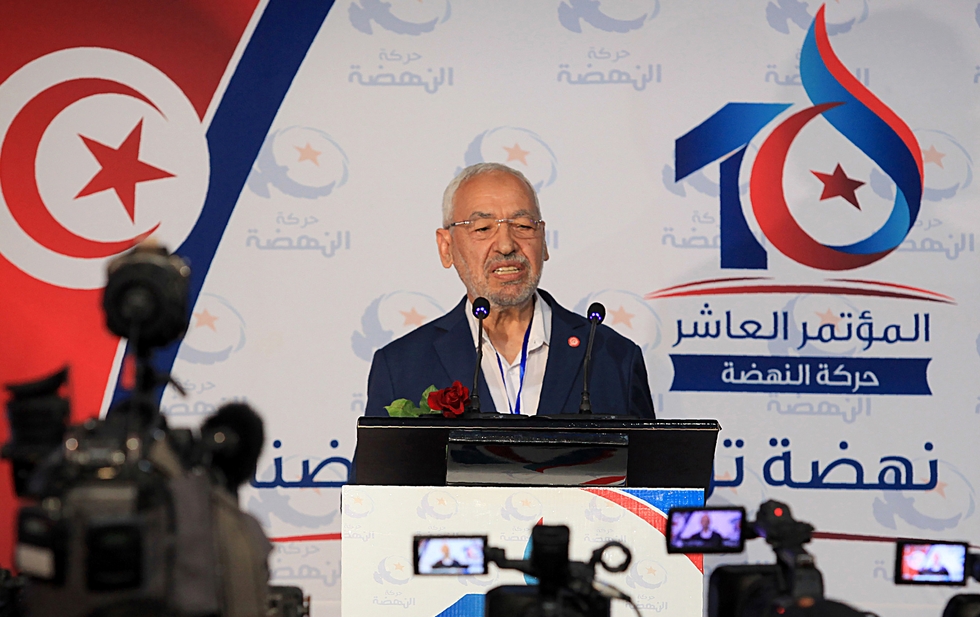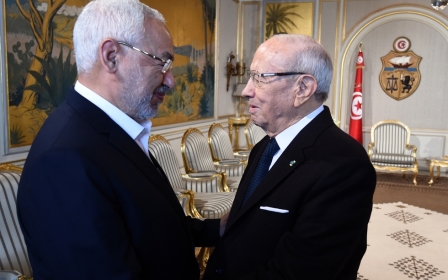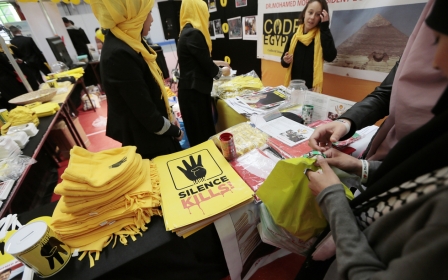Tunisia's Ennahda can change its discourse, but not the reality of political Islam

A number of leaders and cadres from the Tunisian Ennahda movement came out in the few days before the group's general conference in late May to announce a major shift in Ennahda’s identity, and its intellectual and political approach.
What these Ennahda members affirmed, in summary, was that their party had completely turned its back on an identity shaped by political Islam, and that it no longer considered Islamic preaching one of its tasks, in any form. Ennahda was now becoming a national civilian political party, and had completely severed its ties with the Muslim Brotherhood. Indeed, some said the Tunisian movement was never connected to the Brotherhood.
The new Ennahda discourse bore with it an apology for years of the movement’s history of struggle and a declaration of absolution from responsibility for what was described as the crimes perpetrated by some political Islamic forces.
It also included an effort to sanctify the Tunisian state, and imbue a sense of superiority over the commotion elsewhere in the Arab world. This is certainly a new Ennahda discourse. Yet, it is not difficult to discover that reading such discourse relies on the conditions inside Tunisia and its Arab surroundings. The sensational way in which it was unnecessarily produced, is not accurate in its entirety.
There is no doubt that Ennahda, whose name changed more than once since its birth in the late 1970s, was always regarded one of the forces of the Muslims Brotherhood and of political Islam. There is no doubt that the movement contributed to the intellectual and political debate within the broad body of the Muslim Brotherhood. It had, at least on one occasion, a positive role in transforming and developing the group’s vision, such as on the two historic statements of the mid-1990s about the issue of women rights, on the issue of the democratic approach and on a peaceful alternation of powers.
Ennahda’s relationship with the Muslim Brotherhood was not founded through some conspiratorial missionary endeavour, but was a purely Tunisian choice. It is not true at all to claim today that Ennahda was for decades a prisoner of a political Islamic identity that it had no desire for. The Brotherhood relationship and the political Islamic identity were, in way or another, a natural development in Tunisia. The same way as the birth of the political Islamic current during the era that separated the two world wars was a purely historic phenomenon. The fact is that Tunisia lagged behind and was late in joining the historic train of the Arab Muslim societies that generated in their majority political Islamic expressions during the few decades that followed the founding of the Muslim Brotherhood in Egypt and Jamaat e Islami in Pakistan.
From the mid-19th century, a modernisation movement in the Muslim world has brought down the traditional and religious institutions in certain societies or marginalised them to a great extent. This trend has disempowered Islamic scholars, the guardians of Sharia and religious values, and opened the gates of Muslim societies to Western and material influences.
Since the aftermath of the First World War, a deep sense that “Islam is in danger” has spread among Muslims. The modern classes within Muslim societies have started showing divisions regarding the stance toward the winds of modernisation, towards the historic legacy and toward the questions of freedom, justice and the rule of the new minorities and the relationship between the state and society. It was not strange for the new Ottomans in Istanbul in the second half of the 19th Century to consider that the return to Sharia amounted to a restoration of justice.
Political Islam is the product of that historic turning point and not of a conspiracy of someone’s genius. There is no way, no matter how intense the onslaught on the Islamic forces happens to be, that the Islamic current will be obliterated or erased from the Islam’s modern path. Unless Muslim societies find a consensual answer to the question relating to the position and role of Islam in the public sphere, the existence of the Islamic political current will continue as a socio-political and moral necessity for the life of Muslim societies and their constant search for renaissance, freedom and justice.
Yet, political Islam, by virtue of being a historic phenomenon in essence, is not a finished project. It has been, and will always be, a continuously developing and changing expression. The general current of political Islam, including the Muslim Brotherhood, started constitutional in its programmes, then become democratic. For a short while it adopted the idea of an Islamic state but soon realised the profound differences between the modern state system and the traditional Islamic community. Hence, it renounced such an equivocal slogan.
In a number of Muslim states in the past few decades, an inclination has emerged towards separating the missionary from the political, upon the assumption that the two spheres are, to a certain degree, governed by two different moral and practical frameworks. Such an inclination started in Turkey and was successfully manifested in Morocco. Egypt seems to be heading now in the direction of accomplishing such a separation. In Tunisia, the Ennahda made the first mistake in 2011 when it announced the conversion of the movement completely into a political party. It could have worked through two separate entities, a missionary one and a political one. But it did not do that. That means that Ennahda decided, upon the restoration of free political life in Tunisia, to give up missionary tasks.
The claim today that Ennahda is separating the missionary from the political does not seem to lay the foundations for anything new. Ultimately, and because political Islam is still a vital necessity for the life of Arab and Muslim societies, and because what remains of the scholars institution is preoccupied in the endeavour to discern the impurity of wine from the chasteness of hashish and in justifying obedience to tyrants, the vacuum that will be left behind by Ennahda will be occupied by nihilistic groups from within Jihadi Salafism, the so-called Islamic State and their likes.
No matter what, severing ties with the Muslim Brotherhood is, certainly, Ennahda’s free choice just as was its choice to join the Brotherhood umbrella three decades ago. Generally speaking, what is known to the majority of researchers into the history of the Muslim Brotherhood is that the group’s global umbrella was always a nominal umbrella and was never able, and most probably did not try to impose a common programme or unified political choices upon the various Muslim Brotherhood organisations. The problem does not lie in the option to rid oneself of the Brotherhood connection, which is feeble anyway, nor in liberating oneself from the political Islamic identity. The problem is that this step is being declared within a context of speaking in superior terms to, and in denunciation of, a wide popular current that may even be considered the biggest political current ever in a tangible number of Arab states.
The forces of political Islam’s general current, spearheaded by the Muslim Brotherhood, have struggled, for nearly a century, for the independence of their states; they struggled for the freedom of the peoples and for the establishment of a just system of governance that expresses the will of the majority of the people and safeguard their interests. Since the moment it stood in the face of despotism of Tunisian leader Habib Bourguiba, Ennahda was not an exception to this. There is nothing shameful in this history and there is nothing in it to warrant condemnation. What deserves, truly, to be condemned is the regime of minorities, whether social, political, sectarian or fascist, that seized control of the resources and capabilities of the peoples and the countries and that employed before, and continues to employ, the ugliest forms of state violence in order to perpetuate their control and hegemony.
However, the most conspicuous development in the new Ennahda discourse has to do with the language of sanctifying the state, which seems more like Russian President Vladimir Putin’s language than the language of democrats. Such discourse might have been understandable had Tunisia been one of the superpowers, or had the history of this state been a source of pride and pleasure. The modern state was born in Tunisia, just as in the case of other similar states in Istanbul and Cairo, since the middle of the 19thCentury. Its brief history has been shrouded in failure and disappointment. This state has been neither able to protect the independence of the country nor able to create progress and prosperity for it.
Whenever the failure of the state increases, its social base narrows and the levels of violence employed to maintain hegemony and control over the people and the country’s resources escalates. What is clear, and this is not just in Tunisia alone, is that there will be no solution for the files of independence, renaissance and prosperity with the continued existence of this state as it is. What Ennahda can offer of essential and genuine contribution for Tunisia in the aftermath of the people’s revolution, is a critical approach toward this state rather than the development of a discourse that sanctifies it.
One of the interpretations for this change in Ennahda’s self-perception is the existence of a Maghreb specificity, and that Ennahda today is inspired by this specificity. Yet, no one has explained that this specificity means and whether the path of modernisation movement and its legacy, or the phenomenon of the ascendance of minorities to power, or the state’s hegemony via violence, are different in Tunisia than they are in the other Arab countries.
In fact, this Maghreb specificity is nothing but a myth. It would seem that Ennahda, just as some Maghreb intellectuals, believes what it has contributed to inventing. The other interpretation says that Ennahda, which feared the repercussions of the eruption of Egypt's counter revolution in the summer of 2013, has chosen the safe path. Political movements are themselves, of course, living creatures. Sometimes, some fear and some sensitivity are not bad. But fear and sensitivity should not drive a political movement with such a long history of struggle and sacrifice to make panicked and hasty decisions.
- Basheer Nafi is a senior research fellow at Al Jazeera Centre for Studies.
The views expressed in this article belong to the author and do not necessarily reflect the editorial policy of Middle East Eye.
Photo: Tunisian Ennahda Party leader Rached Ghannouchi holds a press conference after being reelected at the head of the party, on 23 May, 2016, in Hammamet, south of Tunis (AFP).
New MEE newsletter: Jerusalem Dispatch
Sign up to get the latest insights and analysis on Israel-Palestine, alongside Turkey Unpacked and other MEE newsletters
Middle East Eye delivers independent and unrivalled coverage and analysis of the Middle East, North Africa and beyond. To learn more about republishing this content and the associated fees, please fill out this form. More about MEE can be found here.





